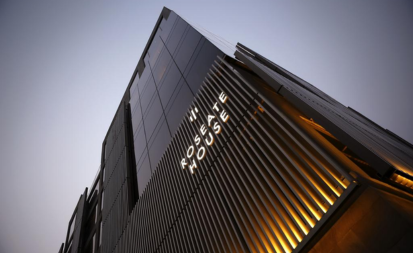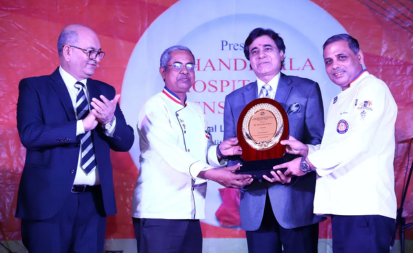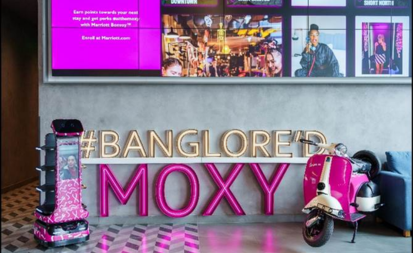A Glorious Journey of 25 years from being a Restaurant Manager to a Principle in the Hospitality Education Industry
In conversation with Mr Gladvin Rego- Principal - Lexicon Institute of Hotel Management You've been into this industry for a long period of time. Please share your journey with us? Little did I know that a field

In conversation with Mr Gladvin Rego- Principal – Lexicon Institute of Hotel Management
You’ve been into this industry for a long period of time. Please share your journey with us?
Little did I know that a field I accidentally joined in December 1997, would result in an amazing journey of 25 years in the hospitality education industry. Having completed my Hotel Management Diploma from IHM Mumbai in 1990, I worked for 7 years in the industry. Being a Restaurant Manager I used to do a break shift. In October 97, after marriage, I realised that the only time I could spend quality time with my wife was on her off day or mine. Though I loved the work that I was doing, a change was waiting to happen.
My wife, a teacher, jokingly suggested I try teaching. I took that suggestion seriously and applied to several institutes. I was pleasantly surprised when I got a chance to teach F&B service with Rizvi college in Mumbai and so began my journey in education. In those days there were rarely any teacher training programmes and content development was always a challenge. Overhead projectors, transparencies, library books and charts were my education tools. My first tryst with structured teacher training was in 2000 when I attended the Certified Hospitality Educator (CHE) workshop of the AHLEI, which I facilitate to this day. Slowly I transformed from an information giver to a facilitator. All by accident.
Being in education, one can easily lose touch with operations, hence I also started conducting training programs in hotels. Colleagues appreciated my ability to network and contribute to the industry, little did they know that I was doing this for my next EMI. My maximum learning in the past 25 years have been through conversations with students, colleagues, seniors and leaders in the hospitality industry. Their stories and experiences have really helped me do my job well.
Thanks to weekend offs, the diverse religious holidays, 30 days’ vacation and the birth and death anniversaries of our great leaders, I couldn’t have asked for more work life balance. This also gave me sufficient training time within the industry. Noble profession, I am not too sure, teaching gave me immense job satisfaction as it came to me naturally.
There were technical challenges as well. When the colleges switched to the University programs, we were told to get a bachelor’s degree, specialisation didn’t matter. So, I got a degree in Psychology and Political Science and a Masters in Tourism to teach Hotel Management. There were far too many incentives to be associated with the hospitality industry through teaching, but the greatest joy was, and still is, knowing that you made a meaningful difference to the lives of many.
If I would relive any of my best working days, it will always be as a teacher.
What steps should be taken to enhance the education in the Hospitality Industry?
Education has undergone a sea change in the past two decades. Nothing influenced it more than the pandemic. Gone are the days when teachers would dread the digital medium. But a lot still needs to be done.
Faculty development and upgradation should be a mandatory requirement. Though the industry innovates rapidly, syllabi in universities don’t. Methodologies and pedagogies need to include more engagement of learners through interactive methods.
A teacher today is more content in completing syllabus and getting brownie points by doing all the mandatory documentation for the approval of government regulators. One colleague rightly pointed out that she has forgotten whether she is a faculty or an administrator. There is no time to research which leads to repetitive classes with similar content.
Faculty should engage with open ended conversations with the industry to create more robust teaching content. Industry don’t go by the rule book. Guests visit hotels to experience hospitality. Beyond a point technical knowledge and skills take a backseat and it is the ability to connect with the feelings of others that make some properties more special than the others. Teaching this is very difficult in a classroom, it has to be experiential. Some of the faculty members are very distant from this industry requirement. Basking in the glory of qualifications, university gradings and awards won will only make education more complacent.
My vision for the Lexicon Institute of Hotel Management, which I head, is simple. Create “Day Zero Professionals”, a human resource which will produce results from Day 1. All students who take up a course don’t have similar aspirations and capabilities. Identifying them early and working on their natural traits would enhance their ability to succeed.
The institute has to work on two fronts. The first is to know what kind of roles and tasks are prevalent in the industry or going to be available in time to come. The purpose of education is to fulfil requirement of the future. The second is to identify who will fit into these roles early on and get them ready during the program. This requires a dynamic and at times a chaotic syllabus. Many Principals are not comfortable with this. If you train them for skills as waiters and cooks, they will get jobs of waiters and cooks. In the future rigid and structured teaching will only form 60 percent of our syllabus. The other 40 percent will be through continuous inputs from the employers. This will be possible for only the quick response institutes of which Lexicon is one. Introduction of Spanish and Mandarin as languages, certification with cigar giant Davidoff and several new age course certifications have been initiated by us at the suggestion of the industry.
What benefits do students get from the tie-ups with multinational groups and How are Mentorship programmes helpful?
Even before we started our first batch, we put our collaboration in place with major hotel companies like Marriott, Accor and Sarovar. This enabled us to understand the culture, branding and core values of several of their brands. Getting a senior leader from each of these brands to interact with students in classroom settings creates commitment from the industry towards its future resource – the most prized human resource. Students understand the brand values and distinct career scope of each of these verticals and are better informed about career choices. The operational heads do get to interact with educators and see their infrastructure and this builds up confidence in the recruitment and selection processes.
Mentorship is the buzzword of the future. Students joining the industry (read final year students) will require lot more convincing inputs from the leaders of the path to be taken, especially the ones least taken. Well mentored students will be more resilient to failures and this one quality will determine the creation of entrepreneurs and job-creators for this industry.
Informational interviewing is an area that senior leaders indulge in with academia and educators should train their students to engage in. Spending an hour, one-on-one with a hospitality leader, clarifying doubts and understanding the rewards and challenges of a hospitality career will reduce disappointment and make students mentally ready.
To what extent has the approach changed after the pandemic in the educational sector? How much did the pandemic affect the Hospitality Institutes? Was there a loss of interest or no active participation after the pandemic among the hospitality aspirants?
The pandemic affected the education sector as much as it did to others. Though the institutes responded with robust online curriculum, the skill training was a major disconnect. The institutes have since caught up on missed time, but the holistic development of face-to-face training is a struggle.
My advice to the aspirants who wish to join this industry is – ‘This industry trains you for multiple life and job skills which are transferable to many industries. I can safely say – We can absorb them all.’
There is at present a trust deficit amongst hospitality aspirants, seen by the low admission numbers across institutes. This is short term as the education sector is geared to deliver and cover all short comings in the next academic year. The low intakes will also be seen for a maximum of one more year. As hotels in India are almost doubling their inventory in the next five years, confidence amongst the aspirants will come back.
The industry needs to take a stand of how it will deal with its workforce. Long working hours and salary structures are serious concerns. We didn’t move out of stone age because we ran out of stones, it was because we found something better. The career options for a hospitality graduate are far too many compared to yesteryears.
What would educational institutes look like in the next ten years?
We will see several verticals segregating in the education sector. Today we call the programs Hotel Management but teach Hotel Operations. Going forward this will get more distinct and the program may split into two separate verticals or be more mature in content to include management functions and applications. The latter is most likely as the government gets its act together to bring in the new education policy which will give an extra year for academics, mandating a four-year program.
Six-month internship will become a thing of the past, as Institutes focus 3 years on education and create a one-year OJT (on the job) training to be completed at the students first work place. This will ensure low college drop outs and create a valid 4-year program.
Industry will get more involved in collaborating, running or sponsoring skill centres, as the biggest challenges for the industry today is to find staff for the bottom line and will continue to be in the future.
How does management help to maintain the academic eco-system through academia industry collaboration?
Going forward, management will have no option but to engage in academia industry collaborations. Educators from the industry will form an equal if not more percentage of facilitators. As university degrees become secondary, students will want meaningful education and not technical rote learning. Universities will have to introduce more industry-oriented curriculum to remain relevant.
Its ‘Manthan’ time for all stake holders, hopefully everyone will get some ‘Amrit’ to savour.
 English
English French
French German
German Italian
Italian




